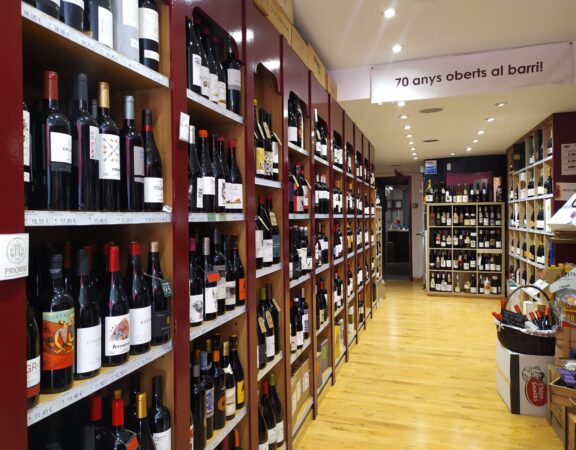-
Supermarkets, the biggest adversaries of wine cellars
-
Wine cellars experience a loss of 26.7% after confinement.
It is bad times for wine cellars. The closure of the catering industry, coupled with the new trend of direct sales between wineries and consumers, has done nothing but harm to these places which promote the culture of wine. Currently, with more than five thousand establishments throughout the country, according to the Cámara de Vinotecas y Afines (CAVA), the wine cellars are one of the main sales channels for 80% of the wineries. It further complicated the decision by half a hundred municipalities to ban the sale of alcohol, as its abuse was considered to promote violence at times of isolation.
Casanova street is located Ve-i-viniters, wine cellar and Barcelona family distributor which has been in the neighborhood for seventy-five years and has been forced to close for a month. Now, their future is uncertain. “We’ll have to rethink the business because being so focused on the restoration of distribution, this has cost us an 80% loss of our billing,” Miriam Villanova, the owner, says that they have prioritized everything that’s small proximity wineries to try to help their neighbours by profession.
In addition, during confinement, Ve-i-vinters offered direct-to-door distribution to partially alleviate the decline in income. Villanova points out that although it is true that wine consumption has increased over the last few months, this has not had an impact on its sales, because most buy in supermarkets.
Places and Purchase Channels Before and After confinement
According to a report by the European Association of Wine Economists (U.S.A.U.A.) and the Cheaire Vins et Spiritueux of INSEEC U, Vinotheques have experienced a decline in customers of 26.7%, from 35.23% to 8.48% after confinement. As Villanova has said, the main wine bottle shopping channels are still supermarkets, which have only suffered a loss of 5.05% of customers. Similarly, local food shops have reduced their customers by 4.88%, and wineries by 20.78%.
In turn, the only channel that has seen its demand increased is the online one, at an incipient 2.38%. For this reason, more and more wine cellars aim to create a website as a virtual shop window for their products, as is the case with Ve-i-vinaters, which offers us its services in consulteddevils.com.
This is consumed in Covid-19 time
But not everything is bad news, not all the wine houses have lived it the same. Villarroel 134, Ninot’s Cellier has been more lucky. “When closing restaurants people pay more attention to the kitchen,” comments Juan Manuel Corrias, who has been in the shop for three years. According to the master, the winemakers are selling a little more, as well as wines other than the usual. “People investigate more and dare to try new things or spend a little more on each bottle,” he argues.
The maximum capacity also has its advantages, as it allows for more effective customer treatment. On the other hand, he notes that “every week there is a new client who, to walk a little longer or walk through the neighborhood, rediscovers shops that he previously paid no attention to”.
Dante Alighieri said that wine sows poetry in the hearts. Perhaps for this reason, in times of uncertainty and unrest, wine becomes a refuge: according to the Spanish Monitoring Centre for the Market of Wine (OEMV), wine consumption has grown above 50% during confinement, although it is softened as de-escalation progresses. In this respect, Ve-i-vinters highlights the vermut boom, which is much demanded by customers to drink in family or with friends. As James Joyce said, “What is better than sitting at the end of the day and drinking wine with friends, or a substitute for friends?
The recent supremacy of wine: beer on the bottom
In recent years, according to Corrias, adults aged between 35 and 45 leave beer aside and show renewed interest in wine. Interest that has become apparent during the pandemic. “New wine consumers opt for a fresh, young, fruity product,” beware. The CEO of Terroir Champenois, Manuel Pla, claims that “the concept of wine is a social construct”. Building that has been progressively modified and rebuilt, resulting in technicalities that have removed the experience of people who are not involved in wine making, to this day. This lack of understanding has generated a widespread complex around wine in recent decades, and the settlement of the Covid-19 virus has changed our perception of wine to some extent.
And the passion for a good came is not just breathing between barrica piles and bottles dusted. Also, the wine cellars, far from these imposing architectural structures and seas of wine-growing vines, make it difficult for anyone who takes their heads off their door to observe another type of wine paradise.






